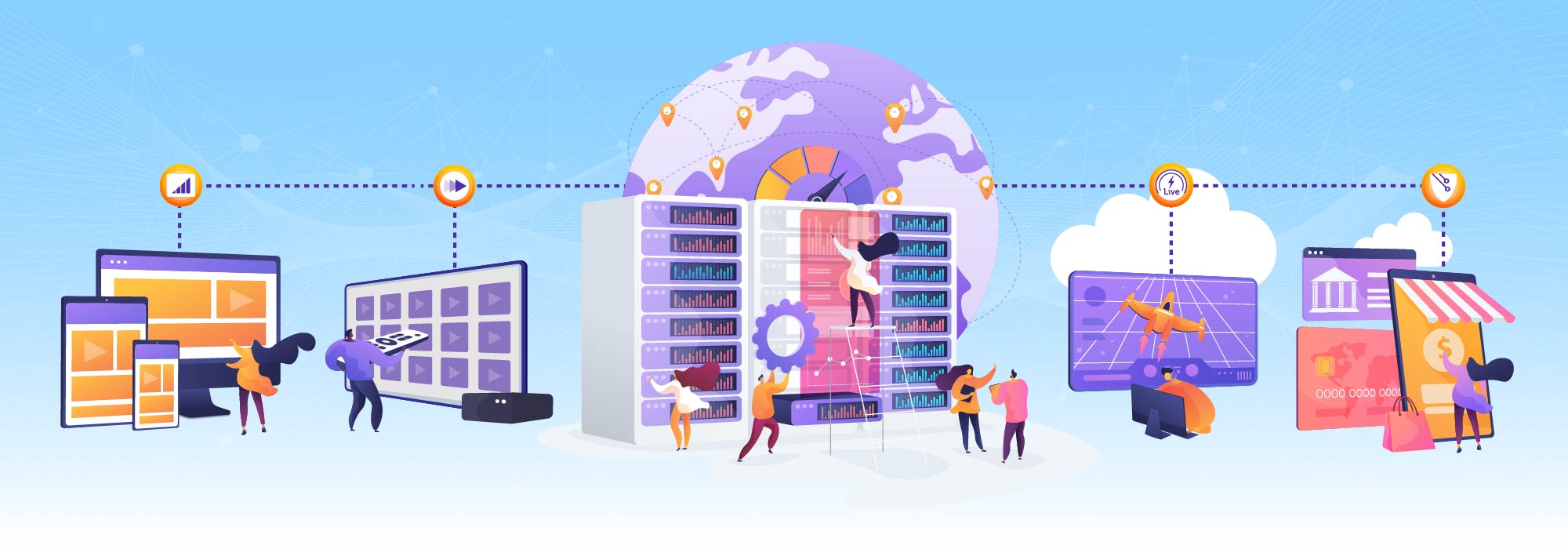Over the last couple of decades, some significant developments in the digital landscape have driven businesses to look for better ways to deliver content. One is the increased internet penetration, allowing more consumers to come online for their shopping and services needs. Related to this is the increase in internet speeds which have led to complex, media-rich websites becoming the norm. And to compound this, the expectations of consumers have also risen, as they look to access services as and when they want, with minimal delay.
This has led to the rise of Content Delivery Networks or CDNs. CDNs are networks of geographically distributed servers that allow content distribution to users with minimal latency.
Read More: What is a CDN?
More and more businesses are adopting CDNs to allow their large global audience base to access their services. This is because CDNs provide businesses with a number of benefits when it comes to delivering content quickly and seamlessly. Most of these benefits are a direct result of how a CDN works, with some benefits even being a consequence of others.
The Benefits Of Using a CDN
CDNs offer four significant benefits:
- Increased reliability. Nothing is infallible, including the internet. Servers go down, networks become overly congested, and the end result is that connections get disrupted. CDNs enable web applications to continue operating even during these tumultuous times. They do this by balancing the load of network traffic so that no single server gets overworked.
- Better performance. Using a CDN can reduce load times by up to 50%. This is done by reducing file sizes, decreasing the distance between where content is kept and where it’s headed, and optimizing servers to respond faster to user requests.
- Cost savings. Reducing the number of exchanges to and from the origin server is the main way CDNs cut down on expenditure. With CDNs, much of the website’s contents is cached, meaning less work for the origin server as it does not have to re-deliver the same content repeatedly.
- Protection against cyber-attacks. CDNs are paramount when it comes to defending against both denial-of serve (DoS) and distributed denial-of-service (DDoS) attacks. In being able to absorb large quantities of junk network traffic, they are able to keep websites running even when being attacked.
8 Advantages of Using a CDN
1. Decrease Server Load
Recall that a CDN comprises a geographically distributed network of servers for delivering content. It is not just one main server that stores the content, from client devices that retrieve data packets. This strategic placement of servers across vast distances means that any server is not in danger of being overloaded. This in turn frees up the overall capacity, serving a number of concurrent users, and brings down bandwidth and delivery costs.
2. Improve Site Speed and Website Performance
CDNs are immensely helpful for businesses that rely on their websites to deliver content quickly. Think of an e-commerce business that needs to convert shoppers who land on their website quickly into customers and grow sales. Any significant delay in page load times can lead to drop-offs, with users bouncing off the web page, exiting the site, and even moving to a competitor’s website.
With CDNs, a business can deliver high-performance website content quickly by caching content on the CDN servers closest to end-users, this content can include HTML code, image files, dynamic content, and JavaScript.
So when the end-user requests a page or content on the website, they don’t have to wait for the request to go to the origin server. They can access the web content from the servers nearest to them, minimizing the delay for the user and improving web performance for the business through better end-user response times.
Improving site speed is also a major compontent of SEO, and ensuring that a website is as optimized as possible for search engine crawlers can lead to significant gains in this vital marketing channel.
3. Allow Audience Segmentation Based on User Analytics
One benefit of CDNs that may often be overlooked is their ability to provide valuable insights on the audience. CDNs today are responsible for around half of the world’s internet traffic, which means that they collect vast amounts of data on users like their internet connectivity, device usage, and more. These translate into helpful analytics which can be put to use in decision making.
User analytics such as real-time load statistics, capacity per customer, most active areas, and the popularity of different content assets form a rich source of info that can be used to understand trends and content consumption patterns. Businesses can use these insights to help their developers optimize the website further, improve the user experience and contribute to more sales and conversions.
4. Reduce Packet Loss and Lower Network Latency
When information is transmitted across devices over the internet, such as from a website to an end-user, it is done through packets. These are small units of data that contain information about the network addresses of the source and destination, error detection and correction rules, protocol identifiers and more, along with the application or website data.
If these packets have to move across large distances and devices before reaching the end-user, some may get lost along the way. They could also be delayed, which increases latency or they may arrive at the end-user in a different order than expected, also known as jitter. All of these lead to a less than optimum user experience for the end-user, especially when the content transmitted involves high-definition video, audio, or live streaming. Think of common issues such as out-of-sync audio, display distortions, choppy audio and others.
Content Acceleration
Ultra-low latency, lightning-fast page loading, best experience to your users.
Dynamic Web Acceleration
Expands Your Global Reach with Fast, Agile, Secure Web Experiences.
5. Enable Advanced Website Security
An indirect benefit of CDN services is in improving website security. Since CDNs help avoid web server overloads by distributing content across their edge servers, they can also be a powerful force against cyber attacks that rely on sending traffic spikes to key servers.
This is especially helpful in the case of DDoS attacks, where attackers aim to overwhelm an important DNS server by sending a large volume of requests. The goal is to bring this server down and along with it the website. Such downtime can inflict economic losses for a business, reputation damage, and lead to other more sinister hacks and attacks. CDNs are able to thwart such DDoS attacks by acting as a DDoS protection and mitigation platform, distributing the load equally across the entire capacity of the network and protecting data centers.
Read More: Discover our Web Application Fireware Solution
6. Enhance Content Availability
The increased consumer demands on today’s media-rich internet landscape require businesses to ensure high availability of content on their websites. The higher the traffic volume, the higher is the pressure placed on origin servers to prevent their websites from crashing and keep their content available.
Think of a business that provides video streaming services to a large user base, spread across the world. The traffic load of these service providers can often hit millions of requests per second, especially if the content is trending or topical. This can cause the origin server to fail, causing an outage and resulting in poor experience and unsatisfied consumers.
CDNs are capable of absorbing all this traffic and spreading it across its distributed infrastructure, allowing a business to enhance its content availability irrespective of the load. If one server happens to go down, other points of presence (PoPs) can pick up the traffic and keep the service uninterrupted. Some high-quality CDNs also have the functionality to automatically sense availability and immediately redirect users and requests, also known as load balancing which enables 100 per cent availability at all times.
7. Contribute to Cost Savings by Reducing Bandwidth
Because of their ability to thwart one of the most common types of cyber attacks in the form of DDoS prevention, CDNs are indirectly responsible for saving costs and preventing unwanted expenses and losses associated with server outages and compromised websites.
But they also help reduce costs by optimizing the bandwidth used by a business by limiting data transfers. If the volume of requests to a website is constantly high, this can consume a correspondingly high bandwidth, driving up costs. CDNs help reduce the bandwidth demands on origin servers, reducing bandwidth and web hosting costs for website owners.
In general, going with a CDN provider will help businesses do away with the costs of setting up infrastructure, hosting and servers across the globe. Instead, they will only need to pay according to the traffic and amount of requests, with some CDN providers giving you more granular control of costs with self-service and optimization features to manage expenses for the required performance.
8. Increase Audience Reach and Scale Effectively
All of the above benefits put together allows businesses to reach a much bigger global audience using CDNs.
CDNs make it easier and cost-effective to deliver content to users in a geographic location far away from the HQ of a business and its main servers. They also contribute to providing a consistent user experience for customers. Keeping customers satisfied this way will lead to a snowball effect and accelerate audience expansion, allowing businesses to scale into new markets effectively.
This guide includes eight key CDN benefits, however, the advantages of a content delivery network do not stop there. For more information on how a self-service CDN could enhance your business, take a look at CDNetworks CDN Pro solution and get in touch today for a pricing breakdown and the opportunity for a free trial.
The Types of Businesses That Benefit From Using a CDN
Any business that has an online presence could benefit from using a CDN. With fewer interruptions to network connections, a better customer experience is achieved.
Here are some of the more common areas of business where CDNs are often found:
- E-commerce – Businesses operating in this sector are super reliant on CDNs to ensure their products are available to buy 24/7. Companies with continuous uptime are able to serve a wider audience and often have a better customer retention rate. Both of which help to maximize profits.
- Education – The rise of online courses has grown immensely over the past decade. Now people from all over the world can take part in the same course without the need to leave their homes. Many of these courses require students to stream audio and video lectures. Using a CDN ensures that no matter where the participant’s location is in regards to the server, their user experience will not be compromised.
- Media and Entertainment – Many media and advertising sites use streaming services to deliver content to users. Using a CDN enhances this process to ensure there is less chance of any network disruption or lag, regardless of the user’s location.
- Online Gaming – Gaming is one of the most demanding applications due not only to the tremendous amount of data and transactions but because there are so many players connected at once. In order to provide the maximum uptime possible, gaming companies must implement robust systems with the greatest levels of availability, reliability, fault tolerance, and scalability. These CDN features are essential to ensure that gamers have access to their games when they want to play them.


